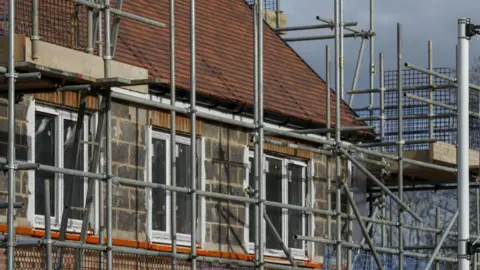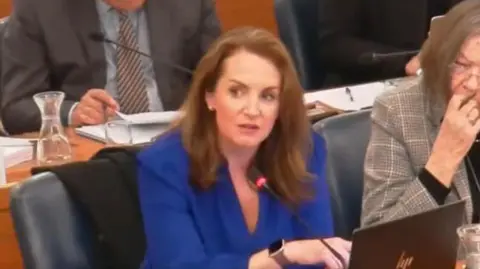Row over infrastructure pot spending at council
 Getty Images
Getty ImagesConservative councillors say that money raised through funds for infrastructure and community projects has become a "hidden revenue stream" for Waverley Borough Council.
The council allocates income generated by the interest from unspent Community Infrastructure Levies (CIL) and Section 106 (S106) agreements to its main revenue account, the general fund, which includes spending on providing services.
Its Conservative leader, Jane Austin, said other local authorities had made the decision to ringfence it for infrastructure and that Waverley should do the same.
The Liberal Democrats, part of a coalition that run the council, said the interest earned was managed responsibly and in line with national guidance and is a standard practice.
CIL are charges made by councils on any new developments and are typically used to pay for infrastructure, such as schools and roads.
Meanwhile, S106 agreements are negotiated between developers and councils, with funds used to benefit communities, and try to limit and mitigate the impact of new houses.
 Waverley Borough Council
Waverley Borough CouncilThe council is setting up a cross party working group to look at CIL and is reviewing cases of charges, after some homeowners were asked to pay thousands of pounds in fees for making home improvements, without the ability to appeal.
The Conservatives said the council had £28.3m of unspent CIL and S106 money as of 31 March 2025, which they claim is a large amount in proportion to the size of the authority.
Ms Austin said it had "quietly become a hidden revenue stream for the council" and that there would be a "black hole" in the finances without it.
"We've got to the stage where our council is basically relying on the interest from this CIL and from this S106 money," she told BBC Radio Surrey.
A council spokesperson refuted this, stating that Waverley had been "independently recognised as the most financially stable local authority in Surrey".
"It is also, to our knowledge, the only council in the UK to have published a balanced budget for both 2024/25 and 2025/26," they added.
The Liberal Democrat leader of the council, Paul Follows, said it was "standard practice" for "funds to be allocated to specific infrastructure projects and held by the council until they need to be paid for".
"These projects typically require extensive planning and can take several months, or even years, to complete," he said.
"All funds held by the council are managed in accordance with our approved treasury management strategy. This ensures that they generate interest, in line with our statutory responsibility to secure best value for public money.
"Any interest earned is retained within the council's general fund and is reinvested into local services and the enhancement of public amenities."
According to the council, more than £2.1m of the £27.5m collected in CIL receipts to date had already been spent, with more than £15.2m allocated to specific infrastructure projects.
"Each year, we are committed to setting a responsible and balanced budget that maximises the resources available to deliver high-quality public services for the people of Waverley. This commitment remains unchanged, regardless of the level of interest income received," a council spokesperson added.
Follow BBC Surrey on Facebook, and on X. Send your story ideas to [email protected] or WhatsApp us on 08081 002250.
